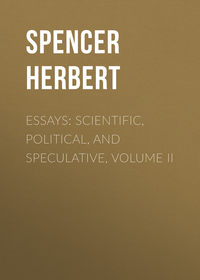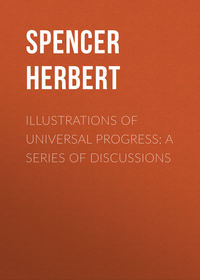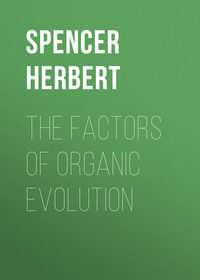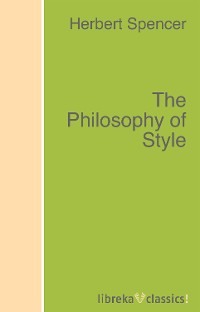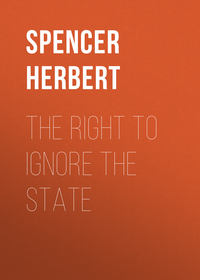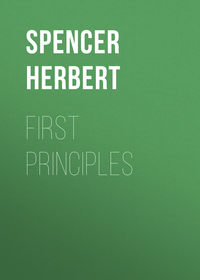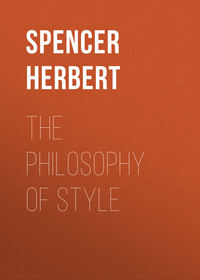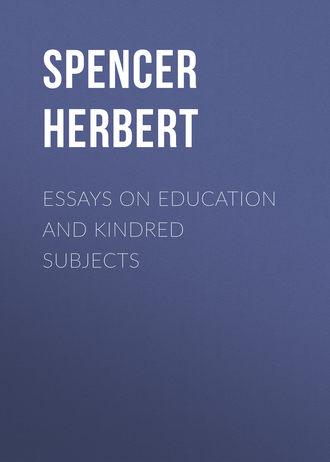 полная версия
полная версияEssays on Education and Kindred Subjects
Let them remember, too, that at first the idea of death differed widely from that which we have; that there are still tribes who, on the decease of one of their number, attempt to make the corpse stand, and put food into his mouth; that the Peruvians had feasts at which the mummies of their dead Incas presided, when, as Prescott says, they paid attention "to these insensible remains as if they were instinct with life;" that among the Fejees it is believed that every enemy has to be killed twice; that the Eastern Pagans give extension and figure to the soul, and attribute to it all the same substances, both solid and liquid, of which our bodies are composed; and that it is the custom among most barbarous races to bury food, weapons, and trinkets along with the dead body, under the manifest belief that it will presently need them.
Lastly, let them remember that the other world, as originally conceived, is simply some distant part of this world – some Elysian fields, some happy hunting-ground, accessible even to the living, and to which, after death, men travel in anticipation of a life analogous in general character to that which they led before. Then, co-ordinating these general facts – the ascription of unknown powers to chiefs and medicine men; the belief in deities having human forms, passions, and behaviour; the imperfect comprehension of death as distinguished from life; and the proximity of the future abode to the present, both in position and character – let them reflect whether they do not almost unavoidably suggest the conclusion that the aboriginal god is the dead chief; the chief not dead in our sense, but gone away carrying with him food and weapons to some rumoured region of plenty, some promised land, whither he had long intended to lead his followers, and whence he will presently return to fetch them.
This hypothesis once entertained, is seen to harmonise with all primitive ideas and practices. The sons of the deified chief reigning after him, it necessarily happens that all early kings are held descendants of the gods; and the fact that alike in Assyria, Egypt, among the Jews, Phœnicians, and ancient Britons, kings' names were formed out of the names of the gods, is fully explained. The genesis of Polytheism out of Fetishism, by the successive migrations of the race of god-kings to the other world – a genesis illustrated in the Greek mythology, alike by the precise genealogy of the deities, and by the specifically asserted apotheosis of the later ones – tends further to bear it out. It explains the fact that in the old creeds, as in the still extant creed of the Otaheitans, every family has its guardian spirit, who is supposed to be one of their departed relatives; and that they sacrifice to these as minor gods – a practice still pursued by the Chinese and even by the Russians. It is perfectly congruous with the Grecian myths concerning the wars of the Gods with the Titans and their final usurpation; and it similarly agrees with the fact that among the Teutonic gods proper was one Freir who came among them by adoption, "but was born among the Vanes, a somewhat mysterious other dynasty of gods, who had been conquered and superseded by the stronger and more warlike Odin dynasty." It harmonises, too, with the belief that there are different gods to different territories and nations, as there were different chiefs; that these gods contend for supremacy as chiefs do; and it gives meaning to the boast of neighbouring tribes – "Our god is greater than your god." It is confirmed by the notion universally current in early times, that the gods come from this other abode, in which they commonly live, and appear among men – speak to them, help them, punish them. And remembering this, it becomes manifest that the prayers put up by primitive peoples to their gods for aid in battle, are meant literally – that their gods are expected to come back from the other kingdom they are reigning over, and once more fight the old enemies they had before warred against so implacably; and it needs but to name the Iliad, to remind every one how thoroughly they believed the expectation fulfilled.
All government, then, being originally that of the strong man who has become a fetish by some manifestation of superiority, there arises, at his death – his supposed departure on a long projected expedition, in which he is accompanied by his slaves and concubines sacrificed at his tomb – their arises, then, the incipient division of religious from political control, of civil rule from spiritual. His son becomes deputed chief during his absence; his authority is cited as that by which his son acts; his vengeance is invoked on all who disobey his son; and his commands, as previously known or as asserted by his son, become the germ of a moral code; a fact we shall the more clearly perceive if we remember, that early moral codes inculcate mainly the virtues of the warrior, and the duty of exterminating some neighbouring tribe whose existence is an offence to the deity.
From this point onwards, these two kinds of authority, at first complicated together as those of principal and agent, become slowly more and more distinct. As experience accumulates, and ideas of causation grow more precise, kings lose their supernatural attributes; and, instead of God-king, become God-descended king, God-appointed king, the Lord's anointed, the vicegerent of heaven, ruler reigning by Divine right. The old theory, however, long clings to men in feeling, after it has disappeared in name; and "such divinity doth hedge a king," that even now, many, on first seeing one, feel a secret surprise at finding him an ordinary sample of humanity. The sacredness attaching to royalty attaches afterwards to its appended institutions – to legislatures, to laws. Legal and illegal are synonymous with right and wrong; the authority of Parliament is held unlimited; and a lingering faith in governmental power continually generates unfounded hopes from its enactments. Political scepticism, however, having destroyed the divine prestige of royalty, goes on ever increasing, and promises ultimately to reduce the State to a purely secular institution, whose regulations are limited in their sphere, and have no other authority than the general will. Meanwhile, the religious control has been little by little separating itself from the civil, both in its essence and in its forms. While from the God-king of the savage have arisen in one direction, secular rulers who, age by age, have been losing the sacred attributes men ascribed to them; there has arisen in another direction, the conception of a deity, who, at first human in all things, has been gradually losing human materiality, human form, human passions, human modes of action: until now, anthropomorphism has become a reproach.
Along with this wide divergence in men's ideas of the divine and civil ruler has been taking place a corresponding divergence in the codes of conduct respectively proceeding from them. While the king was a deputy-god – a governor such as the Jews looked for in the Messiah – a governor considered, as the Czar still is, "our God upon Earth," – it, of course, followed that his commands were the supreme rules. But as men ceased to believe in his supernatural origin and nature, his commands ceased to be the highest; and there arose a distinction between the regulations made by him, and the regulations handed down from the old god-kings, who were rendered ever more sacred by time and the accumulation of myths. Hence came respectively, Law and Morality: the one growing ever more concrete, the other more abstract; the authority of the one ever on the decrease, that of the other ever on the increase; originally the same, but now placed daily in more marked antagonism.
Simultaneously there has been going on a separation of the institutions administering these two codes of conduct. While they were yet one, of course Church and State were one: the king was arch-priest, not nominally, but really – alike the giver of new commands and the chief interpreter of the old commands; and the deputy-priests coming out of his family were thus simply expounders of the dictates of their ancestry: at first as recollected, and afterwards as ascertained by professed interviews with them. This union – which still existed practically during the middle ages, when the authority of kings was mixed up with the authority of the pope, when there were bishop-rulers having all the powers of feudal lords, and when priests punished by penances – has been, step by step, becoming less close. Though monarchs are still "defenders of the faith," and ecclesiastical chiefs, they are but nominally such. Though bishops still have civil power, it is not what they once had. Protestantism shook loose the bonds of union; Dissent has long been busy in organising a mechanism for the exercise of religious control, wholly independent of law; in America, a separate organisation for that purpose already exists; and if anything is to be hoped from the Anti-State-Church Association – or, as it has been newly named, "The Society for the Liberation of Religion from State Patronage and Control" – we shall presently have a separate organisation here also.
Thus alike in authority, in essence, and in form, political and spiritual rule have been ever more widely diverging from the same root. That increasing division of labour which marks the progress of society in other things, marks it also in this separation of government into civil and religious; and if we observe how the morality which forms the substance of religions in general, is beginning to be purified from the associated creeds, we may anticipate that this division will be ultimately carried much further.
Passing now to the third species of control – that of Manners – we shall find that this, too, while it had a common genesis with the others, has gradually come to have a distinct sphere and a special embodiment. Among early aggregations of men before yet social observances existed, the sole forms of courtesy known were the signs of submission to the strong man; as the sole law was his will, and the sole religion the awe of his supposed supernaturalness. Originally, ceremonies were modes of behaviour to the god-king. Our commonest titles have been derived from his names. And all salutations were primarily worship paid to him. Let us trace out these truths in detail, beginning with titles.
The fact already noticed, that the names of early kings among divers races are formed by the addition of certain syllables to the names of their gods – which certain syllables, like our Mac and Fitz, probably mean "son of," or "descended from" – at once gives meaning to the term Father as a divine title. And when we read, in Selden, that "the composition out of these names of Deities was not only proper to Kings: their Grandes and more honourable Subjects" (no doubt members of the royal race) "had sometimes the like;" we see how the term Father, properly used by these also, and by their multiplying descendants, came to be a title used by the people in general. And it is significant as bearing on this point, that among the most barbarous nation in Europe, where belief in the divine nature of the ruler still lingers, Father in this higher sense is still a regal distinction. When, again, we remember how the divinity at first ascribed to kings was not a complimentary fiction but a supposed fact; and how, further, under the Fetish philosophy the celestial bodies are believed to be personages who once lived among men; we see that the appellations of oriental rulers, "Brother to the Sun," etc., were probably once expressive of a genuine belief; and have simply, like many other things, continued in use after all meaning has gone out of them. We way infer, too, that the titles, God, Lord, Divinity, were given to primitive rulers literally – that the nostra divinitas applied to the Roman emperors, and the various sacred designations that have been borne by monarchs, down to the still extant phrase, "Our Lord the King," are the dead and dying forms of what were once living facts. From these names, God, Father, Lord, Divinity, originally belonging to the God-king, and afterwards to God and the king, the derivation of our commonest titles of respect is clearly traceable.
There is reason to think that these titles were originally proper names. Not only do we see among the Egyptians, where Pharaoh was synonymous with king, and among the Romans, where to be Cæsar meant to be Emperor, that the proper names of the greatest men were transferred to their successors, and so became class names; but in the Scandinavian mythology we may trace a human title of honour up to the proper name of a divine personage. In Anglo-Saxon bealdor, or baldor, means Lord; and Balder is the name of the favourite of Odin's sons – the gods who with him constitute the Teutonic Pantheon. How these names of honour became general is easily understood. The relatives of the primitive kings – the grandees described by Selden as having names formed on those of the gods, and shown by this to be members of the divine race – necessarily shared in the epithets, such as Lord, descriptive of superhuman relationships and nature. Their ever-multiplying offspring inheriting these, gradually rendered them comparatively common. And then they came to be applied to every man of power: partly from the fact that, in these early days when men conceived divinity simply as a stronger kind of humanity, great persons could be called by divine epithets with but little exaggeration; partly from the fact that the unusually potent were apt to be considered as unrecognised or illegitimate descendants of "the strong, the destroyer, the powerful one;" and partly, also, from compliment and the desire to propitiate.
Progressively as superstition diminished, this last became the sole cause. And if we remember that it is the nature of compliment, as we daily hear it, to attribute more than is due – that in the constantly widening application of "esquire," in the perpetual repetition of "your honour" by the fawning Irishman, and in the use of the name "gentleman" to any coalheaver or dustman by the lower classes of London, we have current examples of the depreciation of titles consequent on compliment – and that in barbarous times, when the wish to propitiate was stronger than now, this effect must have been greater; we shall see that there naturally arose an extensive misuse of all early distinctions. Hence the facts, that the Jews called Herod a god; that Father, in its higher sense, was a term used among them by servants to masters; that Lord was applicable to any person of worth and power. Hence, too, the fact that, in the later periods of the Roman Empire, every man saluted his neighbour as Dominus and Rex.
But it is in the titles of the middle ages, and in the growth of our modern ones out of them, that the process is most clearly seen. Herr, Don, Signior, Seigneur, Sennor, were all originally names of rulers – of feudal lords. By the complimentary use of these names to all who could, on any pretence, be supposed to merit them, and by successive degradations of them from each step in the descent to a still lower one, they have come to be common forms of address. At first the phrase in which a serf accosted his despotic chief, mein herr is now familiarly applied in Germany to ordinary people. The Spanish title Don, once proper to noblemen and gentlemen only, is now accorded to all classes. So, too, is it with Signior in Italy. Seigneur and Monseigneur, by contraction in Sieur and Monsieur, have produced the term of respect claimed by every Frenchman. And whether Sire be or be not a like contraction of Signior, it is clear that, as it was borne by sundry of the ancient feudal lords of France, who, as Selden says, "affected rather to bee stiled by the name of Sire than Baron, as Le Sire de Montmorencie, Le Sire de Beauieu, and the like," and as it has been commonly used to monarchs, our word Sir, which is derived from it, originally meant lord or king. Thus, too, is it with feminine titles. Lady, which, according to Horne Tooke, means exalted, and was at first given only to the few, is now given to all women of education. Dame, once an honourable name to which, in old books, we find the epithets of "high-born" and "stately" affixed, has now, by repeated widenings of its application, become relatively a term of contempt. And if we trace the compound of this, ma Dame, through its contractions —Madam, ma'am, mam, mum, we find that the "Yes'm" of Sally to her mistress is originally equivalent to "Yes, my exalted," or "Yes, your highness." Throughout, therefore, the genesis of words of honour has been the same. Just as with the Jews and with the Romans, has it been with the modern Europeans. Tracing these everyday names to their primitive significations of lord and king, and remembering that in aboriginal societies these were applied only to the gods and their descendants, we arrive at the conclusion that our familiar Sir and Monsieur are, in their primary and expanded meanings, terms of adoration.
Further to illustrate this gradual depreciation of titles and to confirm the inference drawn, it may be well to notice in passing, that the oldest of them have, as might be expected, been depreciated to the greatest extent. Thus, Master– a word proved by its derivation and by the similarity of the connate words in other languages (Fr., maître for master; Russ., master: Dan., meester; Ger., meister) to have been one of the earliest in use for expressing lordship – has now become applicable to children only, and under the modification of "Mister," to persons next above the labourer. Again, knighthood, the oldest kind of dignity, is also the lowest; and Knight Bachelor, which is the lowest order of knighthood, is more ancient than any other of the orders. Similarly, too, with the peerage, Baron is alike the earliest and least elevated of its divisions. This continual degradation of all names of honour has, from time to time, made it requisite to introduce new ones having that distinguishing effect which the originals had lost by generality of use; just as our habit of misapplying superlatives has, by gradually destroying their force, entailed the need for fresh ones. And if, within the last thousand years, this process has produced effects thus marked, we may readily conceive how, during previous thousands, the titles of gods and demi-gods came to be used to all persons exercising power; as they have since come to be used to persons of respectability.
If from names of honour we turn to phrases of honour, we find similar facts. The Oriental styles of address, applied to ordinary people – "I am your slave," "All I have is yours," "I am your sacrifice" – attribute to the individual spoken to the same greatness that Monsieur and My Lord do: they ascribe to him the character of an all-powerful ruler, so immeasurably superior to the speaker as to be his owner. So, likewise, with the Polish expressions of respect – "I throw myself under your feet," "I kiss your feet." In our now meaningless subscription to a formal letter – "Your most obedient servant," – the same thing is visible. Nay, even in the familiar signature "Yours faithfully," the "yours," if interpreted as originally meant, is the expression of a slave to his master.
All these dead forms were once living embodiments of fact – were primarily the genuine indications of that submission to authority which they verbally assert; were afterwards naturally used by the weak and cowardly to propitiate those above them; gradually grew to be considered the due of such; and, by a continually wider misuse, have lost their meanings, as Sir and Master have done. That, like titles, they were in the beginning used only to the God-king, is indicated by the fact that, like titles, they were subsequently used in common to God and the king. Religious worship has ever largely consisted of professions of obedience, of being God's servants, of belonging to him to do what he will with. Like titles, therefore, these common phrases of honour had a devotional origin.
Perhaps, however, it is in the use of the word you as a singular pronoun that the popularising of what were once supreme distinctions is most markedly illustrated. This speaking of a single individual in the plural was originally an honour given only to the highest – was the reciprocal of the imperial "we" assumed by such. Yet now, by being applied to successively lower and lower classes, it has become all but universal. Only by one sect of Christians, and in a few secluded districts, is the primitive thou still used. And the you, in becoming common to all ranks, has simultaneously lost every vestige of the honour once attaching to it.
But the genesis of Manners out of forms of allegiance and worship is above all shown in men's modes of salutation. Note first the significance of the word. Among the Romans, the salutatio was a daily homage paid by clients and inferiors to superiors. This was alike the case with civilians and in the army. The very derivation of our word, therefore, is suggestive of submission. Passing to particular forms of obeisance (mark the word again), let us begin with the Eastern one of baring the feet. This was, primarily, a mark of reverence, alike to a god and a king. The act of Moses before the burning bush, and the practice of Mahometans, who are sworn on the Koran with their shoes off, exemplify the one employment of it; the custom of the Persians, who remove their shoes on entering the presence of their monarch, exemplifies the other. As usual, however, this homage, paid next to inferior rulers, has descended from grade to grade. In India, it is a common mark of respect; a polite man in Turkey always leaves his shoes at the door, while the lower orders of Turks never enter the presence of their superiors but in their stockings; and in Japan, this baring of the feet is an ordinary salutation of man to man.
Take another case. Selden, describing the ceremonies of the Romans, says: – "For whereas it was usual either to kiss the Images of their Gods, or adoring them, to stand somewhat off before them, solemnly moving the right hand to the lips, and then, casting it as if they had cast kisses, to turne the body on the same hand (which was the right forme of Adoration), it grew also by custom, first that the emperors, being next to Deities, and by some accounted as Deities, had the like done to them in acknowledgment of their Greatness." If, now, we call to mind the awkward salute of a village school-boy, made by putting his open hand up to his face and describing a semicircle with his forearm; and if we remember that the salute thus used as a form of reverence in country districts, is most likely a remnant of the feudal times; we shall see reason for thinking that our common wave of the hand to a friend across the street, represents what was primarily a devotional act.
Similarly have originated all forms of respect depending upon inclinations of the body. Entire prostration is the aboriginal sign of submission. The passage of Scripture, "Thou hast put all under his feet," and that other one, so suggestive in its anthropomorphism, "The Lord said unto my Lord, sit thou at my right hand, until I make thine enemies thy footstool," imply, what the Assyrian sculptures fully bear out, that it was the practice of the ancient god-kings of the East to trample upon the conquered. And when we bear in mind that there are existing savages who signify submission by placing the neck under the foot of the person submitted to, it becomes obvious that all prostration, especially when accompanied by kissing the foot, expressed a willingness to be trodden upon – was an attempt to mitigate wrath by saying, in signs, "Tread on me if you will." Remembering, further, that kissing the foot, as of the Pope and of a saint's statue, still continues in Europe to be a mark of extreme reverence; that prostration to feudal lords was once general; and that its disappearance must have taken place, not abruptly, but by gradual modification into something else; we have ground for deriving from these deepest of humiliations all inclinations of respect; especially as the transition is traceable. The reverence of a Russian serf, who bends his head to the ground, and the salaam of the Hindoo, are abridged prostrations; a bow is a short salaam; a nod is a short bow.


